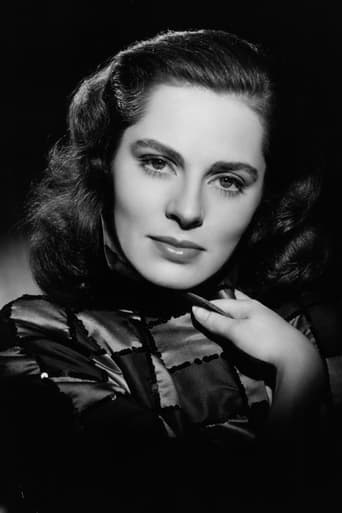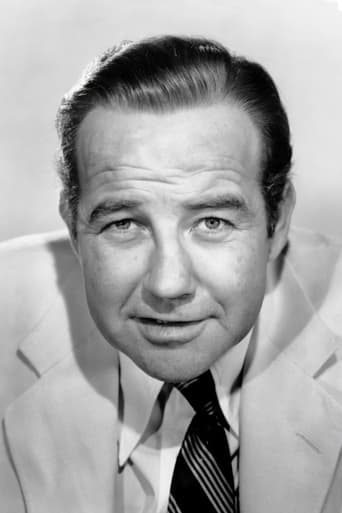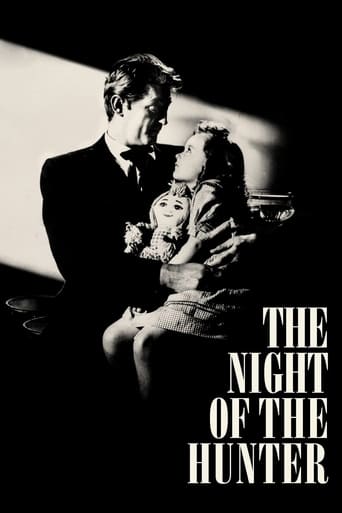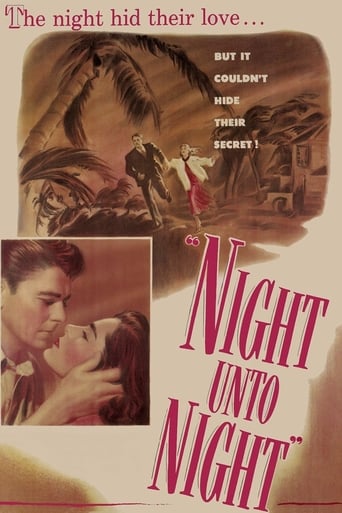
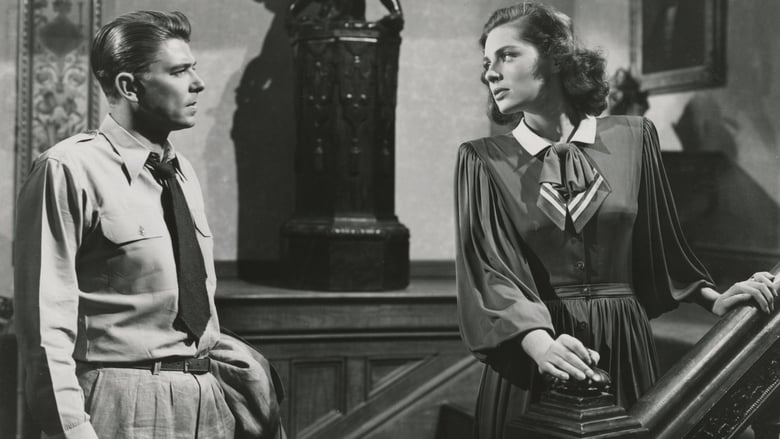
Night Unto Night (1949)
A bleak mansion sits ominously on a cliff above the sea somewhere on Florida's east coast. In its shadows, two people meet: a scientist haunted by incurable illness and a beautiful woman haunted by the voice of her dead husband. Ronald Reagan and Hollywood-debuting Viveca Lindfors star in an eerie drama steeped in religious faith and supernatural fear, in the destructive power of sexual jealousy and the redemptive power of love. In one of his earliest directorial efforts, Don Siegel (Dirty Harry, The Shootist) displays his command of pacing and camerawork, building the action to a climactic hurricane that parallels the tumultuous emotions of characters precariously balanced between now and the hereafter.
Watch Trailer
Cast
Similar titles
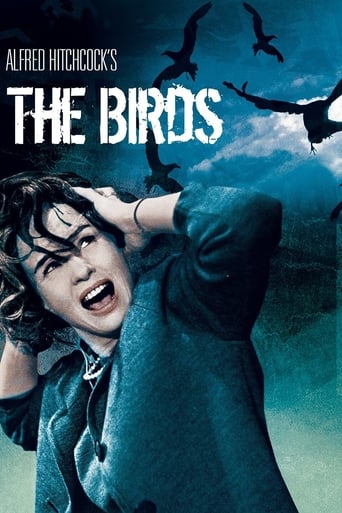
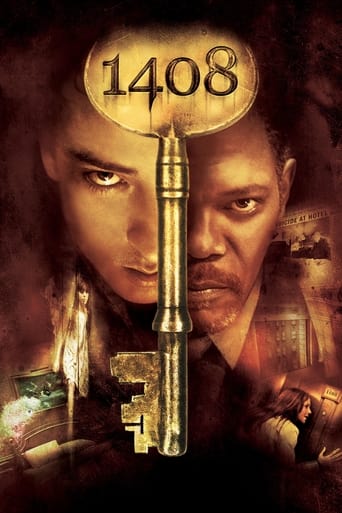

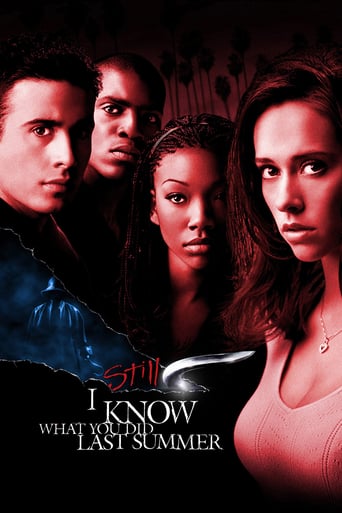

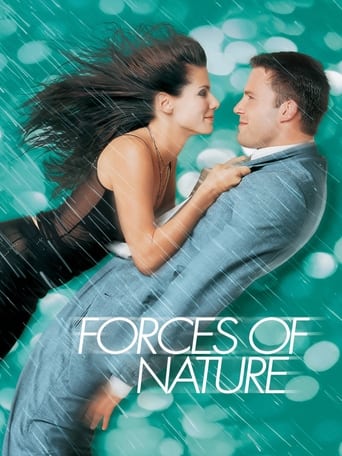
Reviews
Save your money for something good and enjoyable
Good , But It Is Overrated By Some
Boring
It's funny, it's tense, it features two great performances from two actors and the director expertly creates a web of odd tension where you actually don't know what is happening for the majority of the run time.
This review will not be centered on technical or artistic aspects because others have done so and there´s no need to repeat; it is added to supply the information the film fails to give to round the story.When watching this psychological story with supernatural accents about two human beings meeting and helping each other cope with their mutual ghosts (a recent war widow and a biochemistry scientist diagnosed with epilepsy) it struck me, besides the great athmosphere helped by Franz Waxman´s music, that several facts remain unexplained and are left unsolved : the dead husband´s voice haunting his young widow, her sister´s attitude towards life and Ann, the dramatism assigned to being an epileptic which is here equalled to a death sentence, and what comes after the hurricane at the end. All these questions remain unexplained in the movie.All of them are answered in the novel by Philip Wylie. The book is more centered on the metaphysical consideration of life after death and the supernatural phenomena than the picture. There are several more than Bill´s voice and also happen to Galen himself once, troubling him and, as the intellectual scientist he is, making himself both question and discuss them with Ann, friend artist Shawn (who also recalls a couple of unusual experiences himself) and his Psychiatrist and close friend Dr. Johann Altheim (one wonders why they changed the Swiss doctor´s leading and key role, purely anecdotic in the film, for his American colleague Dr. Poole). It will in fact be the inquisitive and open-minded Psychiatrist who will in the end find the answer about the mystery haunting the Gracey mansion, shortly before the hurricane breaks out. This secret is left out of the plot, taking half of the mystery and motivation off.At one point Altheim tells Galen (approximated) "John, you are an architect. You build new structures in your mind where people want to live. Interesting people come in and interesting things happen". That gives us a clue not only about Galen´s personality but about him taking interest in the metaphysical events. Shawn, by the way, is not only the commercially successful unconventional artist but has a darker artistic side not precisely socialist. Lisa, Ann´s sister (Gail in the novel), is so seductive, hedonistic and selfish because she can´t cope with a trauma from her past, one which is connected to the haunted house mystery. It is quite nonsense watching her in the picture acting as she does and towards Ann without much reason for it. Epilepsy as a fatal illness ? Well, back in the 40s there were limited options for resistant cases. Patients not responding to potassium bromide or barbiturates (phenobarbital = Luminal) had only phenytoin (discovered in 1938) to try until II World War ended. The original story happens during the war, that´s why Ann is recently widowed. SPOILER : We are shown that Galen suffers from partial disconnection crises and finds out that he is allergyc to the drug. He later suffers a serious convulsion on the beach. This means the illness is progressing (END OF SPOILER). What should be added is that he had epileptic relatives that ended in mental hospitals. Also that he was turned down by Dr. Poole when applying for military service. AND that´s why he is scared and has even suicidal thoughts at one point, why he is reluctant to make his mind about Ann, and why he says that "death is not the worst thing that can happen to a man, only the last".Finally - the hurricane. It breaks out at the right point, when the truth is known by all, when Galen must decide if love is stronger than his founded fears, and when the secrets that haunt the mansion are discovered and Lisa´s past unveiled and cleared out. After this climax each character will evolve. But we are not told about this, only partially regarding John and Ann. Why not conclude the story, as the novel does? What we don´t see is how they struggle together to survive both the hurricane and their psychological suffering, and then which choice takes each one of them. The movie ends with the impression they went out of budget and had to conclude somehow, leaving loose ends the script had been good enough to have been building from the beginning. The original story does give a clue for everyone. But no spoilers here are intended about the novel either, only answers to better enjoy this movie, which could have been even better.
"Night Unto Night" was made in 1947 and was not released until 1949. That is a very bad sign...a sign that the studio thought they had a bomb on their hands. While I would not call this one a bomb, it certainly could have been a lot better...and it's a shame because the acting is really nice in this one...particularly by Ronald Reagan in the lead.When the film begins, John (Reagan) moves to the Florida coast and finds a home to rent. A widow (Viveca Linfors) wants to leave her home...and not for the usual reasons. She thinks the place is haunted and she hears her dead husband's voice there! John thinks this is nutty but is a gentle man and treats her well despite her odd delusion. Eventually the pair fall in love...but he has a secret he broods over...he has epilepsy.The acting and production values are really nice in this one but the film acted like epilepsy is some sort of death sentence...or at least a life destroyer! It certainly isn't and handling the illness this way seemed pretty crass and silly. Overall, some nice moments but the plot just didn't make a lot of sense...and marrying a man who occasionally goes blank (which happens with many types of seizures) is NOT something that destroys your life or makes you destined to be a lonely recluse! The writing sinks this one....and it's a shame as Reagan is at his best in this one. And, I wonder how epileptics felt when they watched this film...as if they were somehow destined for hollow lives because of the disorder!
Someone missed the boat here, but I'm not sure where it all went wrong. Ronald Reagan, Viveca Lindfors, Broderick Crawford, Rosemary DeCamp and Osa Massen star in "Night Unto Night," a 1949 psychological drama directed by Don Siegel.The story concerns a scientist, John Galen (Reagan) who rents a house in South Florida owned by a widow, Ann (Lindfors) who believes she hears her husband's voice. She continues to mourn her husband and can't embrace life; Galen has been told he has epilepsy and has taken the house to work and try to deal with his situation.Filmed mostly on sets, despite the beautiful cinematography, a lot of scenes look fake. The photography does give the film a brooding atmosphere.There are some interesting metaphysical, "today" ideas tossed around in the script, but the dialogue is pretentious, not at all like normal people speak. Also, epilepsy here seems to be treated as almost a death sentence or at least a communicable disease. Perhaps back in 1949 that's how it was viewed.Reagan, a pleasant actor, didn't have a great range and was much better in comedy. He seems miscast here, and the role didn't play to his main assets, which were charm and a genial presence.Viveca Lindfors was brought over from Sweden as the next Ingrid Bergman; it came as a surprise when husband Don Siegel made a name for himself when he directed "Invasion of the Body Snatchers" when she was supposed to be the star. Despite being beautiful and a wonderful actress, she never made it to the top tier. The actresses who were part of the foreign influx post-war: Alida Valli, Valentina Cortese, Maria Schell, Hildegarde Knef, Mai Zetterling -- all met similar fates. Of all of them, Lindfors was the only one who stayed in America and worked, in film, television, and on the stage - until her death in 1995.A bizarre film, with spirited performances by Lillian Yarbo, Rosemary DeCamp, Osa Massen, and Broderick Crawford.
Stunning photography and Don Siegel's direction make the most of an unusual overly melodramatic story starring Ronald Reagan as a scientist with epilepsy who goes to south Florida on doctor's orders and meets a young woman, (Viveca Lindfors) recently widowed, who is haunted by the voice of her dead husband. Reagan rents her slightly dilapidated beach mansion and experiences several epileptic episodes, but tries his best to keep his condition a secret. Broderick Crawford's role as an artist who lives close by verges on annoying as he goes on and on about art and life. Ossa Massen gives the film a boost as Lindfor's scheming, jealous sister who tries seducing Reagan and later drunkenly blurts out his secret when she realizes that she can't have him. The concluding hurricane arrives just in time, with all the main characters assembled for dinner in the creaky old mansion, and Reagan pushed to verge of suicide by the shame of his medical condition, while Lindfors begs him to reconsider.

